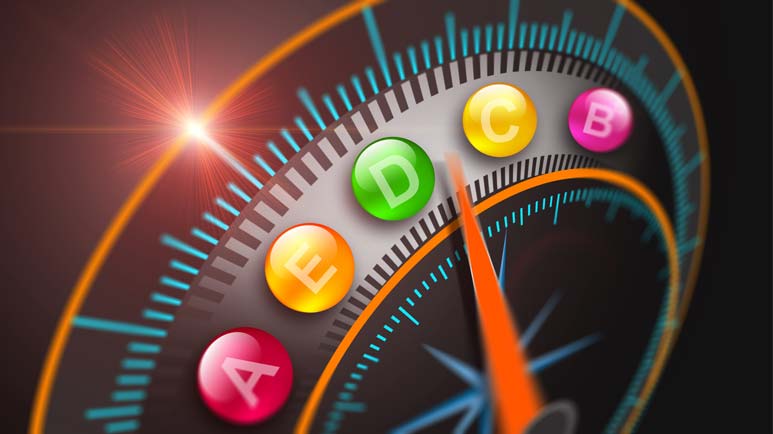Which vitamins and minerals should be taken together or separately - ConsumerLab

A few rules of thumb:
- If you take a large dose of a mineral, it will compete with other minerals to reduce their absorption. The mineral most often taken in large amounts is calcium: The dose is usually several hundred milligrams, compared to doses of just a few milligrams or even microgram amounts (1,000 micrograms = 1 milligram) of most other minerals. So if you take several hundred milligrams of calcium from a supplement, take it at a different time of day than other mineral supplements or a multivitamin/multimineral supplement. Doses of magnesium can also be relatively large and should, ideally, be taken apart from other minerals. If you take high doses of zinc long-term (50 mg or more per day for 10 weeks or longer ), be aware that it can cause copper deficiency, so you may need to supplement with copper as well.
- High doses of calcium or other minerals (including magnesium, certain forms of iron, and zinc) from supplements may decrease the absorption of carotenoids, such as beta-carotene, lycopene and astaxanthin, from foods and/or supplements. It is best to take carotenoid supplements at a different time of day than a supplement or meal containing large amounts of a mineral (e.g., hundreds of milligrams of calcium or magnesium).
- Some vitamins can actually enhance the absorption of other nutrients. Vitamin C, for example, can enhance iron absorption from supplements and plant foods.
- The fat-soluble vitamins (A, D, E, and K) are likely to be better-absorbed if taken with a meal that contains fats. In fact, one study found that taking vitamin D with dinner rather than breakfast increased blood levels of vitamin D by about 50%. If you take a fish oil supplement along with fat-soluble vitamins, this may help a little, but not by much -- the amount of fat in a fish oil capsule is only about 1 gram, while studies that have shown increased absorption of fat-soluble vitamins with meals containing about 15 grams or more. Other supplements that have improved absorption when taken with fats include astaxanthin, boswellia, CoQ10, curcumin/turmeric, and quercetin, many of which are also available in special formulations to further improve absorption.
- It may be best to take fat-soluble vitamins apart from one another, as evidence (mainly from animal and cell studies) suggests that moderate to large doses of fat-soluble vitamins reduce absorption of other fat-soluble vitamins - by about 10 to 50% - due to competition. Absorption of vitamin K appears to be particularly reduced by other fat-soluble vitamins, while vitamin A absorption is least affected and may actually be better absorbed when taken with vitamin E (Goncalves, Food Chem 2015). Taking vitamins D, E, or K several hours before or after other fat-soluble vitamins would seem to maximize their absorption.
- Taking certain supplements with food can reduce gastrointestinal side-effects. For example, taking magnesium with food can reduce the occurrence of diarrhea, and taking iron with food can reduce the chance of stomach upset.
- Be aware that vitamins and minerals can also affect the absorption and effectiveness of medications. You'll find more specific information about this in the "Concerns and Cautions" section of each of our Product Reviews.
Because how and when you take supplements can affect absorption, the table below condenses the information listed and outlines how to maximize absorption of certain vitamins, minerals, and carotenoids.
How to Best Take Vitamins, Minerals, and Carotenoids
| Take with… | Notes to maximize absorption* | |
| Vitamins: | ||
| A, D, E, & K | a meal that contains oils or fats | Don’t take vitamin K with large doses of vitamin E. |
| B-12 | -- | Doses of more than 1.5 mcg should be divided and taken at least 6 hours apart. |
| C | a meal if causing stomach upset | Divide large doses over course of the day |
| Minerals: | ||
| Calcium and magnesium | food to improve absorption and, for magnesium, to reduce diarrhea; not necessary with citrate form | Don’t take together in large amounts (hundreds of milligrams). Don’t take more than 500 mg of calcium at once. |
| Iron | food to reduce stomach upset, but don’t take with tea or coffee | Don’t take with large amounts of other minerals. Getting adequate C may enhance absorption. |
| Zinc | -- | Don’t take with milk, calcium, or high-fiber foods. If taken as lozenge for colds, allow to dissolve — don’t chew. |
| Carotenoids: | ||
| Beta-carotene (vitamin A), lycopene, zeaxanthin, lutein | a meal that contains oils or fats | Don’t take with minerals or meals high in calcium or magnesium |
*To avoid taking things together, take at least two hours apart.
Additionally, keep in mind that these
issues are not of significant concern when consuming a multivitamin
providing up to the recommended daily intakes (RDAs) of vitamins and minerals -- as long as it does not contain more than 250
mg of either calcium or magnesium.
Reposted from: https://www.consumerlab.com/answers/which-vitamins-and-minerals-should-be-taken-together-or-separately/how-to-take-vitamins/

.png)





Comments
Post a Comment